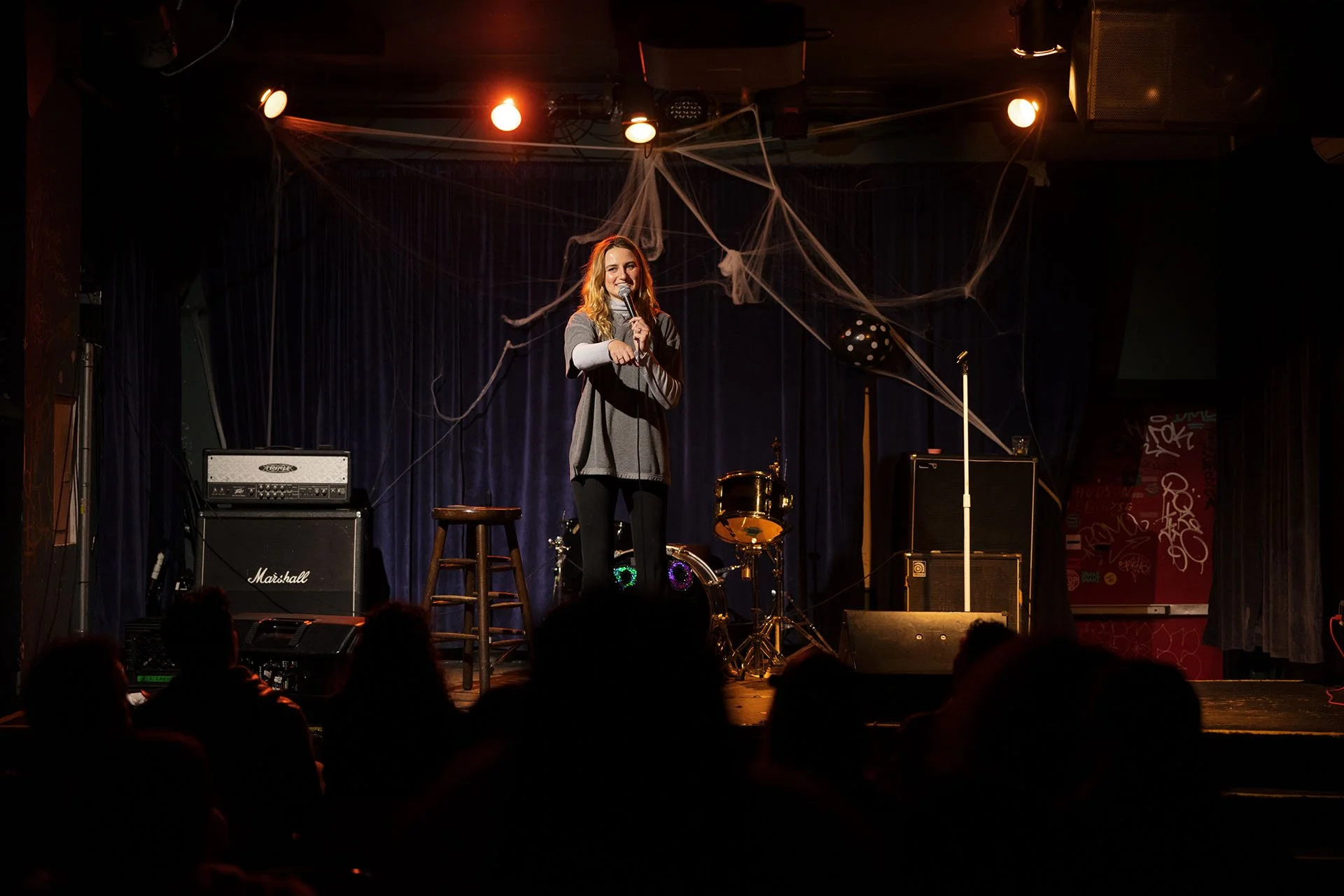Review: Kylie Vincent finds strange and disarming sweet spot between laughter and trauma
Riffing on SpongeBob, blowjobs, standup, and abuse, the comedian coins a new mashup
In Bird, Kylie Vincent is brutally honest about not just her life as a queer, Gen Z standup comedian, but about the traumatic childhood that still haunts her. Photo by John Cafaro
The Cultch presents Bird at the Vancity Culture Lab to April 22 as part of the Femme Festival
MARK TWAIN ONCE said humour is “tragedy plus time”—but some experiences are so dark that no amount of time will make them funny. And the wounds still feel achingly, bracingly fresh in the monologue-standup mashup of Kylie Vincent’s Bird.
The 23-year-old comic manages to be both fragile and empowered—making the title, the nickname she gives herself, perfect. Some call her a trainwreck, and she owns that, but there’s something strong and transgressive in the casual and laugh-filled way she unpacks everything from sexuality to the perils of social media, not to mention some pretty disturbing trauma in her own life. It’s a mix of brutal honesty, crude jokes, and heart-breaking moments. Full disclosure: it can feel uncomfortable, too. The Cultch’s Heather Redfern and Nicole McLuckie stumbled on the show by accident at the last Edinburgh Festival Fringe, and like them, you won’t have seen anything like it.
Staged in the intimate Vancity Culture Lab, with cabaret-style tables pulled onto the tiny stage, Vincent moves cleverly from standup-style microphone to a stool where she speaks unamplified. That setup allows her to alternate easily between observational comedy about life as a queer comedian and more serious stories about growing up in a deeply dysfunctional family in a white-trash corner of California.
On the lighter side, we hear about her early blowjob follies, being pilloried Lord of the Flies-style on Yik Yak, and her affection for Kraft Dinner. Gen Zers will appreciate the pop-culture references riddled throughout, from Harry Potter to Stuart Little. There’s a lot of just random goofy stuff too: at one point, Vincent riffs on the beauty of single-serving oat-milk juice boxes.
On the darker side, we learn about her childhood traumas—some more traumatic than others. Family members all take on zoological nicknames: her lost, neglectful mother is Deer; her more graceful sister is the Gazelle; her anger-prone father is Gorilla. Sometimes the worlds of laughter and abuse intersect awkwardly; a preteen Bird is so used to seeing her dad watch hypersexualized TV shows, she jokes about expecting SpongeBob and Patrick to get it on. Vincent makes it clear that giving voice to her pain helps—and that she hopes that sharing it helps others who feel alone in their trauma.
On another level, Vincent exposes the way that comedy treats female standups. One of her most compelling anecdotes is about the way she handled a sexually aggressive heckler, later schooling the fellow male comedians who cheered her on that her successful takedown was not something she enjoyed. Vincent weighs that treatment against the fact that comedy, which she started at 18 after moving from small-town California to New York City, was the first place where she felt comfortable and free.
What’s clear is this is a person who’s still figuring things out. One of the most powerful confessional moments comes when she admits the complicated feelings she has toward a parent who has done her serious, life-altering harm.
It’s a lot to think about as you head out into the lobby, where on this night the artist sat post-show at a small table selling merch: white T-shirts emblazoned with childlike drawings of herself and the dog she travels with—one that’s a little broken, like her, with its paralyzed back end confined to a mini wheelie-wagon.
Pinballing from dick jokes to body issues to the weirdness of the C-word, the show could maybe stand a bit more structure. But cleaned up and organized, it might not be as messy—and the mess of life is what this is all about.














